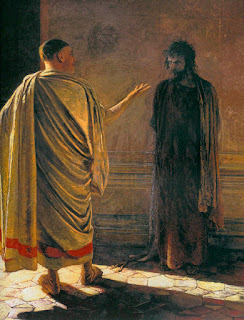The Great Upheaval: Reading Barth’s Early War Sermons
German Soldiers headed to the front (likely 1914) (Public Domain, via Wikimedia Commons) Arguably, the outbreak of the Great War in the summer of 1914 constituted the real beginning of the 20th century, especially in Western European society and culture, as William Klempa notes in introducing this volume of early Karl Barth sermons. This was especially the case in Protestant ecclesiastical and theological circles in Germany, where the war sparked a revolt among young pastors and thinkers. In one camp, Klempa notes, establishment theologians -- including Barth's Marburg mentor Wilhelm Herrmann -- by and large acquiesced to and even offered up religious legitimization to the rising tide of nationalist and militarist sentiment. Thus, Adolf von Harnack, a key confidant for the Kaiser, served as an enthusiastic apologist for the war. For a number of younger theologians, on the other hand, the devastation that ensued as the war progressed was an acid that dissolved naive idealisms.



